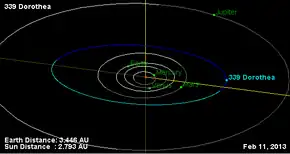 Orbital diagram | |
| Discovery | |
|---|---|
| Discovered by | Max Wolf |
| Discovery date | 25 September 1892 |
| Designations | |
| (339) Dorothea | |
| Pronunciation | /dɒəˈθiːə/[1] |
Named after | Dorothea Klumpke |
| 1892 G | |
| Main belt (Eos) | |
| Orbital characteristics[2] | |
| Epoch 31 July 2016 (JD 2457600.5) | |
| Uncertainty parameter 0 | |
| Observation arc | 123.55 yr (45128 d) |
| Aphelion | 3.3041 AU (494.29 Gm) |
| Perihelion | 2.71937 AU (406.812 Gm) |
| 3.01176 AU (450.553 Gm) | |
| Eccentricity | 0.097082 |
| 5.23 yr (1909.1 d) | |
| 271.598° | |
| 0° 11m 18.852s / day | |
| Inclination | 9.9640° |
| 173.512° | |
| 164.360° | |
| Physical characteristics | |
| Dimensions | 38.25±1.6 km |
| 5.974 h (0.2489 d) | |
| 0.2431±0.021 | |
| S (Tholen) K (SMASSII) | |
| 9.24 | |
Dorothea (minor planet designation: 339 Dorothea) is a large main belt asteroid that was discovered by German astronomer Max Wolf on 25 September 1892 in Heidelberg.
This is a member of the dynamic Eos family of asteroids that were probably formed as the result of a collisional breakup of a parent body.[3]
This asteroid is named after astronomer Dorothea Klumpke,[4] as is 1040 Klumpkea.
References
- ↑ Noah Webster (1884) A Practical Dictionary of the English Language
- ↑ Yeomans, Donald K., "339 Dorothea", JPL Small-Body Database Browser, NASA Jet Propulsion Laboratory, retrieved 11 May 2016.
- ↑ Veeder, G. J.; et al. (March 1995), "Eos, Koronis, and Maria family asteroids: Infrared (JHK) photometry", Icarus, vol. 114, pp. 186–196, Bibcode:1995Icar..114..186V, CiteSeerX 10.1.1.31.2739, doi:10.1006/icar.1995.1053, retrieved 6 April 2013.
- ↑ Vatican Observatory website
External links
- 339 Dorothea at AstDyS-2, Asteroids—Dynamic Site
- 339 Dorothea at the JPL Small-Body Database
This article is issued from Wikipedia. The text is licensed under Creative Commons - Attribution - Sharealike. Additional terms may apply for the media files.